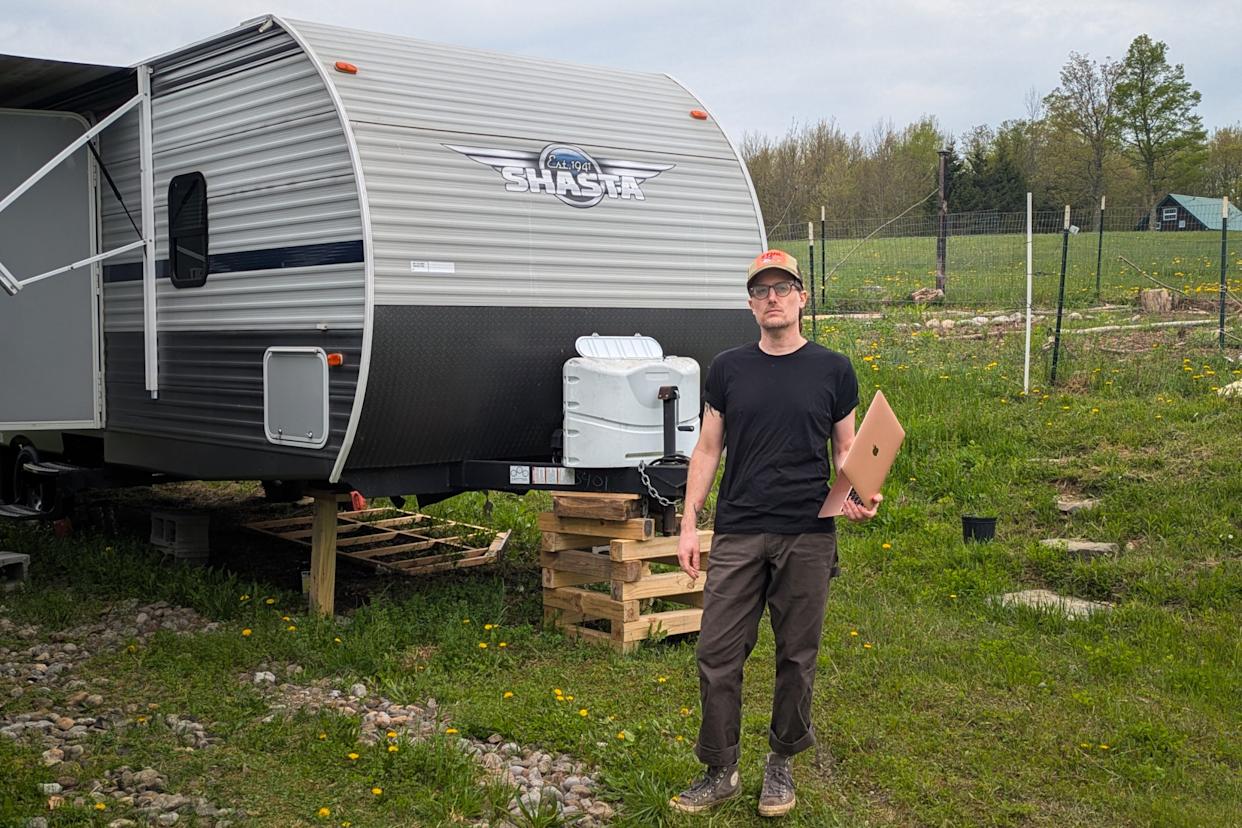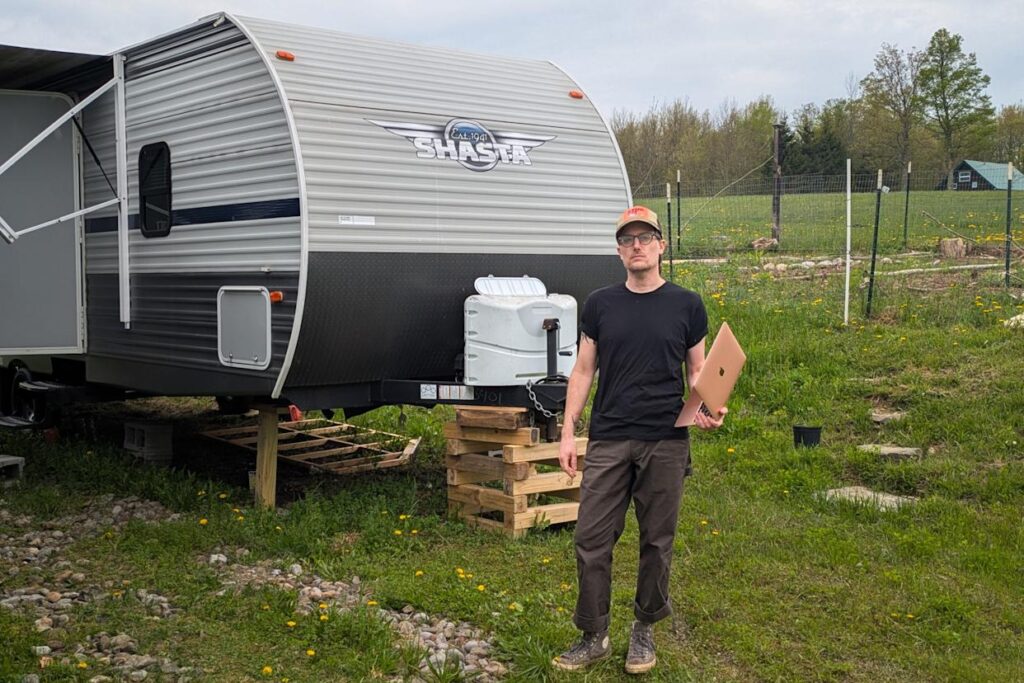“AI Replaced His $150K Tech Job—Now He’s Jobless, Rejected 800 Times, and Living in a Trailer”


Tech layoffs are nothing new for Shawn K (his full legal last name is one letter).
- Anthropic CEO Dario Amodei predicts that AI will take over all coding jobs by next year — but an existential crisis is already plaguing some software engineers. One man who lost his job last year had to live in an RV trailer, DoorDashing and selling his household goods on eBay as his once $150,000 salary turned to dust.
The software engineer first lost his job after the 2008 financial crisis and then again during the pandemic, but on both occasions, he was back on his feet just a few months later.
However, when K was handed a pink slip last April, he immediately realized this time it was different: The AI revolution in the tech industry was happening right in front of him.
Despite two decades of experience and a computer science degree, he’s gotten fewer than 10 interviews out of the 800 applications he’s sent out. Worse, some of those interviews have been with an AI agent rather than a human.”
I feel very invisible,” K told Fortune. “I feel overlooked. I feel like I’m filtered out before the human even gets there.”
And while fears about AI replacing jobs have been around for years, the 42-year-old thinks his experience is just the beginning of a “wave of social and economic disaster.”
“Delivering Survival: How DoorDash Became His Only Option—And Ours Too”
K’s last job was working at a company focused on the metaverse — a field that was predicted to be the next big thing, but got partially overshadowed by the rise of ChatGPT.
Now living in a tiny RV trailer in Central New York, K, with no clue about a new tech job, has had to turn to creative strategies to make ends meet and try to recoup a fraction of his previous $150,000 salary.
In between constantly searching for new jobs, checking his empty email inbox, and researching the latest AI news, he delivers DoorDash orders like Buffalo Wild Wings to the local Holiday Inn and sells random household items like old laptops on eBay. All in all, it only adds up to a few hundred dollars.
He’s also considered going back to school for a tech certificate—or even to obtain his CDL trucking license—but both were scratched off his list due to their hefty financial barrier to entry.
K’s reality may surprise some, given that the U.S. Bureau of Labor Statistics has consistently labeled software engineering as one of the fastest-growing fields, but stories like hers could soon become even more common.
Earlier this year, Anthropic CEO Dario Amodei predicted that more software jobs would soon be lost. By September, he said AI would be writing 90% of the code; furthermore, “In 12 months, we could be in a world where AI will essentially be writing all the code,” he told the Council on Foreign Relations.
In 2024, more than 150,000 tech workers will lose their jobs, and so far in 2025 that number has risen by more than 50,000, according to Layoffs.fyi.
“It’s coming to basically everyone at the appointed time, and we’re already too late to propose any real solutions to prevent the worst of these impacts on society,” K wrote. “Discussion of AI job replacement in the mainstream is still seen as something coming in some vague future, not something that’s already underway.
Losing his job isn’t the only issue
Despite being unemployed for over a year, K still hasn’t lost hope, nor is he angry at AI for replacing him and still calls himself an “AI maximalist.”
“If AI can actually legitimately do a better job than me, I won’t sit here and feel bad that it replaced me and doesn’t have the human touch,” K says.
What’s frustrating, he said, is that companies are using AI to save money by laying off talent — rather than harnessing its power and embracing cyborg workers.
“I think that’s the problem where people are stuck in the old-world business mindset of, well, if I can do the same work that 10 developers were doing with one developer, let’s cut the developer team, rather than saying, oh, well, we have a 10 developer team, let’s do 1,000 times the work we were doing before,” says K.
This story was originally featured on Fortune.com
Read more:
- How Data Centers Created 4.7 million U.S. Jobs—Without Hiring Tech Workers
- At Trump’s $148 million meme coin dinner, ‘the food sucked’ and security was lax, attendee says
- KEA Karnataka KCET Result 2025 Out: Official websites to check result
- How the Federal Reserve is Tackling Economic Uncertainty in 2025
- AI demand alone will require $5.2 trillion in investment-hyperscale data centers




It’s fascinating yet unsettling to see how the AI revolution is reshaping the job market, especially for experienced professionals like Shawn. His story highlights the harsh reality of being filtered out by AI before even reaching a human recruiter, which feels dehumanizing. The shift from a $150,000 salary to DoorDash deliveries is a stark reminder of how quickly circumstances can change. It’s concerning that even fields like the metaverse, once seen as the future, are now overshadowed by AI advancements. Shawn’s resilience is admirable, but it’s disheartening to see someone with his experience struggle so much. Do you think the tech industry is doing enough to support professionals displaced by AI, or is this just the beginning of a larger societal shift?
where to buy amoxicillin without a prescription – https://combamoxi.com/ buy amoxicillin online cheap
amoxil us – https://combamoxi.com/ buy cheap generic amoxil
diflucan for sale – https://gpdifluca.com/ forcan online buy
purchase diflucan generic – https://gpdifluca.com/ order generic diflucan 100mg
cenforce price – https://cenforcers.com/ cost cenforce
cenforce 50mg pills – cenforce rs buy cenforce 100mg pills
how many 5mg cialis can i take at once – click cheap canadian cialis
tadalafil tablets 20 mg side effects – cheap cialis dapoxitine cheap online tadalafil walgreens
buy cialis generic online 10 mg – cheapest cialis cialis online aust
where can i buy cialis online in canada – https://strongtadafl.com/ cialis at canadian pharmacy
order zantac 300mg for sale – zantac 150mg price zantac 150mg cost
viagra sale ireland – https://strongvpls.com/ viagra 100mg street price
buy viagra nz online – https://strongvpls.com/ order viagra online safe
The thoroughness in this section is noteworthy. https://buyfastonl.com/azithromycin.html
I couldn’t turn down commenting. Warmly written! https://buyfastonl.com/azithromycin.html
I am in fact enchant‚e ‘ to coup d’oeil at this blog posts which consists of tons of worthwhile facts, thanks representing providing such data. este sitio
I am in truth enchant‚e ‘ to gleam at this blog posts which consists of tons of profitable facts, thanks for providing such data. comprar synthroid 50mg
More posts like this would bring about the blogosphere more useful. https://ursxdol.com/amoxicillin-antibiotic/
This website positively has all of the bumf and facts I needed adjacent to this subject and didn’t comprehend who to ask. https://ursxdol.com/clomid-for-sale-50-mg/
More posts like this would create the online play more useful. https://prohnrg.com/product/metoprolol-25-mg-tablets/
With thanks. Loads of expertise! https://prohnrg.com/product/omeprazole-20-mg/
This website absolutely has all of the bumf and facts I needed there this subject and didn’t positive who to ask. https://aranitidine.com/fr/acheter-cenforce/
This is the stripe of serenity I take advantage of reading. https://aranitidine.com/fr/cialis-super-active/
mpugl9
With thanks. Loads of knowledge! https://ondactone.com/spironolactone/
More content pieces like this would make the web better. https://ondactone.com/simvastatin/
I am in point of fact enchant‚e ‘ to glance at this blog posts which consists of tons of useful facts, thanks towards providing such data.
mobic medication
The thoroughness in this section is noteworthy.
order clopidogrel online cheap
I couldn’t resist commenting. Adequately written! http://3ak.cn/home.php?mod=space&uid=229264
This website really has all of the tidings and facts I needed about this thesis and didn’t comprehend who to ask. http://shiftdelete.10tl.net/member.php?action=profile&uid=200434
order forxiga 10mg – https://janozin.com/# order forxiga 10mg online cheap
order forxiga without prescription – click purchase forxiga generic
purchase xenical pills – buy orlistat without a prescription order xenical 120mg for sale
where can i buy xenical – on this site buy xenical 60mg without prescription
More delight pieces like this would create the web better. http://www.01.com.hk/member.php?Action=viewprofile&username=Hxetjo
More posts like this would make the online elbow-room more useful. http://pokemonforever.com/User-Nwbgsz
swot анализ развития стороны swot анализа
Looking for second-hand? thrift store store near me We have collected the best stores with clothes, shoes and accessories. Large selection, unique finds, brands at low prices. Convenient catalog and up-to-date contacts.
For research, see this site.
Una piattaforma affidabile e sicura: clicca qui.
La cosa migliore di questo sito è che non serve registrarsi, entri subito nella chat.
If you want to avoid misunderstandings, just check this page.
русское порно молодых новое русское порно
Want to have fun? porno bangladesh melbet Watch porn, buy heroin or ecstasy. Pick up whores or buy marijuana. Come in, we’re waiting
Новые актуальные промокод iherb приложение для выгодных покупок! Скидки на витамины, БАДы, косметику и товары для здоровья. Экономьте до 30% на заказах, используйте проверенные купоны и наслаждайтесь выгодным шопингом.
курсовая работа под заказ заказ контрольных курсовых
оформить займ онлайн займ онлайн
оформить займ онлайн займы онлайн на карту первый
شركة مكافحة حشرات بالاحساء
перевод документов на немецкий бюро перевод сервис
buy cocaine prague buy coke in prague
cocaine prague prague plug
columbian cocain in prague cocain in prague from columbia
prague drugstore cocain in prague from peru
cocaine prague telegram prague drugs
prague plug buy cocaine in telegram
Helpful article. I often type ohmegel wrong but still end up here – the site is really popular.
always works for me.
Helpful insights. I’d say omigle users often end up here too, which proves how popular this site has become.
For a full overview, visit site.
If someone is curious, this site works well for random connections.
I like Hotmegle chat because it connects instantly without delay.
Нужна лабораторная? https://lab-ucheb.ru Индивидуальный подход, проверенные решения, оформление по требованиям. Доступные цены и быстрая помощь.
Нужен чертеж? чертежи в компасе на заказ выполним чертежи для студентов на заказ. Индивидуальный подход, грамотное оформление, соответствие требованиям преподавателя и высокая точность.
Нужна презентация? https://prez-shablony-ucheb.ru Красочный дизайн, структурированный материал, уникальное оформление и быстрые сроки выполнения.
prague plug prague drugs
buy coke in telegram cocaine prague
Нужна презентация? нейросеть сделать презентацию Создавайте убедительные презентации за минуты. Умный генератор формирует структуру, дизайн и иллюстрации из вашего текста. Библиотека шаблонов, фирстиль, графики, экспорт PPTX/PDF, совместная работа и комментарии — всё в одном сервисе.
Проблемы с откачкой? помпа для откачки грязной воды сдаем в аренду мотопомпы и вакуумные установки: осушение котлованов, подвалов, септиков. Производительность до 2000 л/мин, шланги O50–100. Быстрый выезд по городу и области, помощь в подборе. Суточные тарифы, скидки на долгий срок.
заказ значков с логотипом производство значков на заказ
изготовление значков на заказ в москве значок металлический с логотипом
значок на лацкан пиджака на заказ значки изготовить
joszaki regisztracio joszaki.hu/
joszaki regisztracio joszaki
You can shelter yourself and your dearest close being cautious when buying panacea online. Some druggist’s websites function legally and offer convenience, reclusion, cost savings and safeguards as a replacement for purchasing medicines. buy in TerbinaPharmacy https://terbinafines.com/product/levitra.html levitra
You can keep yourself and your stock by being alert when buying prescription online. Some pharmaceutics websites operate legally and sell convenience, solitariness, rate savings and safeguards to purchasing medicines. buy in TerbinaPharmacy https://terbinafines.com/product/cipro.html cipro
I am in truth delighted to gleam at this blog posts which consists of tons of useful facts, thanks for providing such data. TerbinaPharmacy
More posts like this would create the online space more useful. TerbinaPharmacy
The vividness in this piece is exceptional.
More text pieces like this would create the интернет better.
paris sportif foot telecharger 1xbet pour android
melbet telecharger https://parifoot-afrique1.com
foot africain afrik foot pronostic
**mindvault**
mindvault is a premium cognitive support formula created for adults 45+. It’s thoughtfully designed to help maintain clear thinking
фитнес клуб москва фитнес клуб
**gl pro**
gl pro is a natural dietary supplement designed to promote balanced blood sugar levels and curb sugar cravings.
**sugarmute**
sugarmute is a science-guided nutritional supplement created to help maintain balanced blood sugar while supporting steady energy and mental clarity.
**vitta burn**
vitta burn is a liquid dietary supplement formulated to support healthy weight reduction by increasing metabolic rate, reducing hunger, and promoting fat loss.
**synaptigen**
synaptigen is a next-generation brain support supplement that blends natural nootropics, adaptogens
**glucore**
glucore is a nutritional supplement that is given to patients daily to assist in maintaining healthy blood sugar and metabolic rates.
**prodentim**
prodentim an advanced probiotic formulation designed to support exceptional oral hygiene while fortifying teeth and gums.
**nitric boost**
nitric boost is a dietary formula crafted to enhance vitality and promote overall well-being.
**sleep lean**
sleeplean is a US-trusted, naturally focused nighttime support formula that helps your body burn fat while you rest.
**wildgut**
wildgutis a precision-crafted nutritional blend designed to nurture your dog’s digestive tract.
**mitolyn**
mitolyn a nature-inspired supplement crafted to elevate metabolic activity and support sustainable weight management.
**zencortex**
zencortex contains only the natural ingredients that are effective in supporting incredible hearing naturally.
**yusleep**
yusleep is a gentle, nano-enhanced nightly blend designed to help you drift off quickly, stay asleep longer, and wake feeling clear.
**breathe**
breathe is a plant-powered tincture crafted to promote lung performance and enhance your breathing quality.
**prostadine**
prostadine is a next-generation prostate support formula designed to help maintain, restore, and enhance optimal male prostate performance.
Сливы курсов ЕГЭ 2025 https://courses-ege.ru
**pinealxt**
pinealxt is a revolutionary supplement that promotes proper pineal gland function and energy levels to support healthy body function.
**energeia**
energeia is the first and only recipe that targets the root cause of stubborn belly fat and Deadly visceral fat.
**prostabliss**
prostabliss is a carefully developed dietary formula aimed at nurturing prostate vitality and improving urinary comfort.
**boostaro**
boostaro is a specially crafted dietary supplement for men who want to elevate their overall health and vitality.
**potent stream**
potent stream is engineered to promote prostate well-being by counteracting the residue that can build up from hard-water minerals within the urinary tract.
foot africain foot africain
**hepatoburn**
hepatoburn is a premium nutritional formula designed to enhance liver function, boost metabolism, and support natural fat breakdown.
**hepato burn**
hepato burn is a potent, plant-based formula created to promote optimal liver performance and naturally stimulate fat-burning mechanisms.
**flow force max**
flow force max delivers a forward-thinking, plant-focused way to support prostate health—while also helping maintain everyday energy, libido, and overall vitality.
**neuro genica**
neuro genica is a dietary supplement formulated to support nerve health and ease discomfort associated with neuropathy.
**cellufend**
cellufend is a natural supplement developed to support balanced blood sugar levels through a blend of botanical extracts and essential nutrients.
**prodentim**
prodentim is a forward-thinking oral wellness blend crafted to nurture and maintain a balanced mouth microbiome.
**revitag**
revitag is a daily skin-support formula created to promote a healthy complexion and visibly diminish the appearance of skin tags.
very good post, i certainly love this website, keep on it
chery tiggo 7 pro купить chery
Updates on this topic are here: https://suadienlanh12h.com/reshenija-dlja-mediabainga-i-arbitrazha/akkaunty-dlja-facebook-kupit-po-nizkoj-cene-v-12/
Việc của bet thủ là chỉ cần đặt cược con số may mắn mà mình dự đoán sẽ trúng với số tiền cược hợp lý. Hệ thống tiến hành quay thưởng và cập nhật ngay sau đó, tỷ lệ thưởng slot365 xx vip có thể lên tới 1 ăn 99.
Chỉ sau thời gian ngắn ra mắt, slot365 link đã nhanh chóng khẳng định vị thế tại thị trường quốc tế với sự hiện diện tại hơn 20 quốc gia, nổi bật tại châu Á như Việt Nam, Thái Lan, Nhật Bản và đang mở rộng sang châu Âu.
I saw a lot of website but I believe this one has got something special in it in it
Hey everyone! Been checking out jl5 lately and gotta say, it’s pretty slick! Navigation’s smooth and the games are fun. Thumbs up from me!
Argent 1xbet 1xbet apk
Versions de 1xbet 1xbet cd apk
1xbet en ligne 1xbet apk
I don’t think the title of your article matches the content lol. Just kidding, mainly because I had some doubts after reading the article.